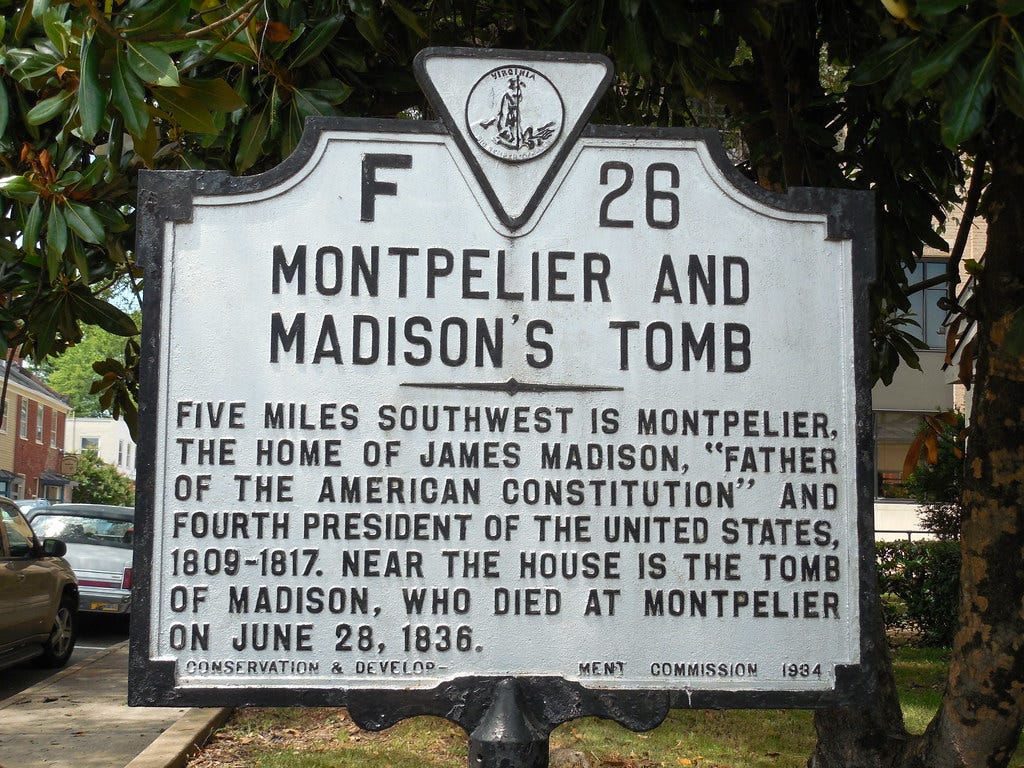In a moment where a sizeable percentage of Americans are not just running away from an ongoing reckoning with the truth about this country’s history—the good, the bad and the ugly—but actively suppressing that truth through every public institution they can seize or control, it is really depressing to see private organizations whose entire purpose is the preservation and dissemination of historical truth fail almost as disastrously in that purpose.
That seems to be what’s happened with the Montpelier Foundation, which looks after the home of President James Madison on behalf of the National Trust for Historic Preservation. As in the case of Mount Vernon and Monticello, the staff at Monticello has worked hard in recent years to find a way to make Madison’s involvement in slavery a central part of education at the site. Even if you feel that attention to slavery is somehow detracting too much from the rest of the history of these important figures in the early American republic, if there’s one place where it’s essential to make it a core part of the history, it’s at their homes, where slavery was a fundamental part of life.
As Charles Pierce puts it at Esquire, “this new era of revanchist crazy is threatening to destroy another good thing”. The key issue here is that the Foundation’s leadership is breaking a carefully negotiated arrangement that seated members of the Montpelier Descendants Committee on the Montpelier Foundation’s board—and that they then moved to fire long-time professional staff who have worked for years on the site because they continued to support the Descendants Committee.
Even if you didn’t really care about the issues at stake, you’d likely acknowledge that breaking an agreement of this kind and retaliating against highly respected professionals who are deeply dedicated to the site and are well-known in the wider community of museum and preservation professionals is a bad look. It’s not a surprise that the decision has met with strong condemnation by the leadership of the National Trust for Historic Preservation and from leaders and professionals representing a wide array of public history institutions.
What’s important about this case is that it’s not really about the content of historical research and teaching at the site, though the Foundation’s attack on its own staff will surely have a chilling effect on their replacements. The more important issue at stake is that the incorporation of the Descendants Committee into the governing board looking after Montpelier was a meaningful structural change that many other public history institutions—and I think many universities—need to take on board.
People whose histories and lives are entangled in museums, memorials and universities are rightfully sick and tired of endless rounds of performative consultation where they are brought in for focus groups, discussions, and photo ops but where the leaders on the other side of the conversation commit to nothing as a result, not even transparency about how and when they might make decisions to act upon or incorporate what they hear in these dialogues. Everybody loves to use the word “stakeholders” in these situations, but the meaninglessness of this bit of jargon becomes keenly evident when a governing board feels free to choose which stakeholders it values and which it will discard. Keeping groups in the role of petitionaries is quite literally a power play. These sites are in some very real sense public trusts: the only point of having power over them is to preserve them for the good of all, to make the truth of the past materially accessible and vividly present.
Moving petitionaries into governance may be scary for the people who are accustomed to sit in boardrooms and do more or less as they will without any accountability. I know it often leads to difficult, contentious conversations about priorities and approaches. That’s what you should be signed on for if you want to part of governance in public history, though. It’s a shift that is long overdue. Hopefully in the case of the Montpelier Foundation, what they’ve just done won’t be a shift away from a meaningful change but instead just a quickly undone hiccup stemming from bad and dishonorable leadership.
Image credit: "Montpelier & Madison's Tomb Marker" by jimmywayne is marked with CC BY-NC-ND 2.0.



